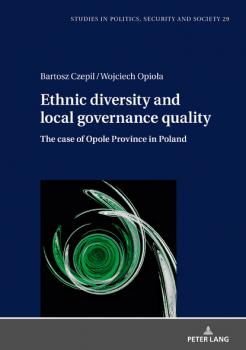Studies in Politics, Security and Society
Скачать книги из серии Studies in Politics, Security and SocietyFrom Subjection to Independence
This book seeks to identify the most important problems in post-World War II Polish-Italian relations. The fundamental reflections come in two parts, in chronological-problematic order, from 1945 to 1958 and 1959 to 1989. The key points are: Poland and the main problems of Italian foreign policy; Italian attitude to the main problems of Polish foreign policy; the effects of cultural exchange; the functioning of cultural institutions; cooperation in pure and applied sciences, and higher education; foreign trade and economic cooperation. The key significance to the problems analysed in the book are documentary collections in the Modern Record Archive, Foreign Ministry Archive in Warsaw, the Historical Archive of the Italian Foreign Ministry, the Central State Archive in Rome.
Ethnic diversity and local governance quality
The book is devoted to relations between the ethnic diversity and the quality of governance at the local level. Opolskie province in Poland is a case for explaining this interdependence. That is because of its history of multiculturalism and the present state of its ethnic diversity. The important feature of this region is, that nearly half of the communes is ethnically homogenous when the rest is ethnically diversified with a strong position of German and Silesian minorities. The preliminary assumption was, that the quality of governance would be higher in communes characterized by ethnic diversity. On the basis of the nested analysis method, authors conducted quantitative and qualitative analysis.
Poland-Mexico towards a Strategic Partnership
The book analyzes relations between Poland and Mexico from historical and contemporary perspective. It includes their political, economic and cultural dimensions, as well as the role of Polish migration to Mexico. The timeframe of the work is from the begining of first direct contacts between the states till 2017 and the announcement of the strategic partnership. The book provides an overview of the general determinants of bilateral relations, their evolution, main problems and challenges in the Polish-Mexican cooperation.
Chernobyl Liquidators. The Unknown Story
The book presents a record of oral accounts given by liquidators who participated in minimizing the effects of the Chernobyl disaster. The main research goal was to present the circumstances of actions taken in the Chernobyl Exclusion Zone in 1986–1988 from the perspective of direct participants of the events in question. The overall work is complemented with archival, press materials and other documentation never published before, as well as materials from the private archives of the survivors. The book presents the reality of the clean-up operations undertaken in the area of the catastrophe and shows the community of liquidators, their living conditions and everyday life in the Chernobyl Zone, as well as the reality in which Chernobyl veterans lived after returning to their homeland.
Global Governance of Oil and Gas Resources in the International Legal Perspective
The principle of permanent sovereignty over natural resources was originally intended to protect economic independence and development of resource-rich countries. Now, it is heading towards fair and equitable distribution of resources. The complex of regimes for global governance of oil and gas resources includes trade, investment protection, maritime areas, environmental issues, transparency and accountability of oil and gas sector, human rights and protection of local communities. Despite the fact that it is national states who are traditionally perceived to be central actors in the governance of natural resources, the issue is currently the object of multidimensional global interest. The key to sustainable development in this area is intersectoral and transnational cooperation.









